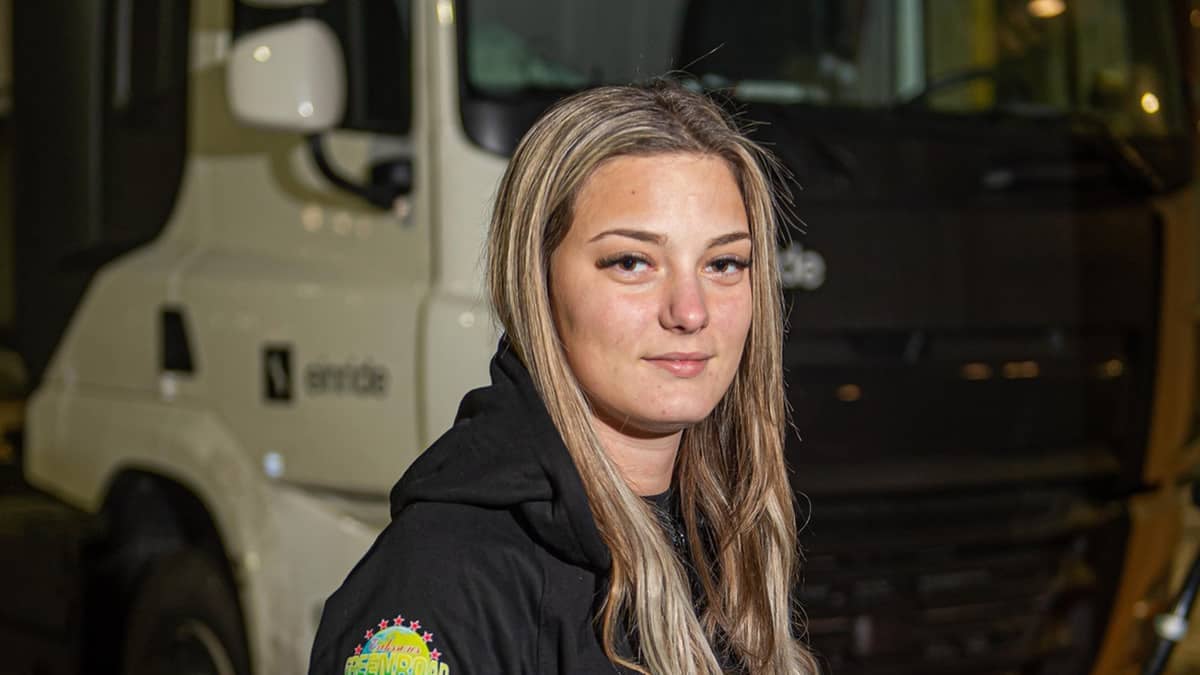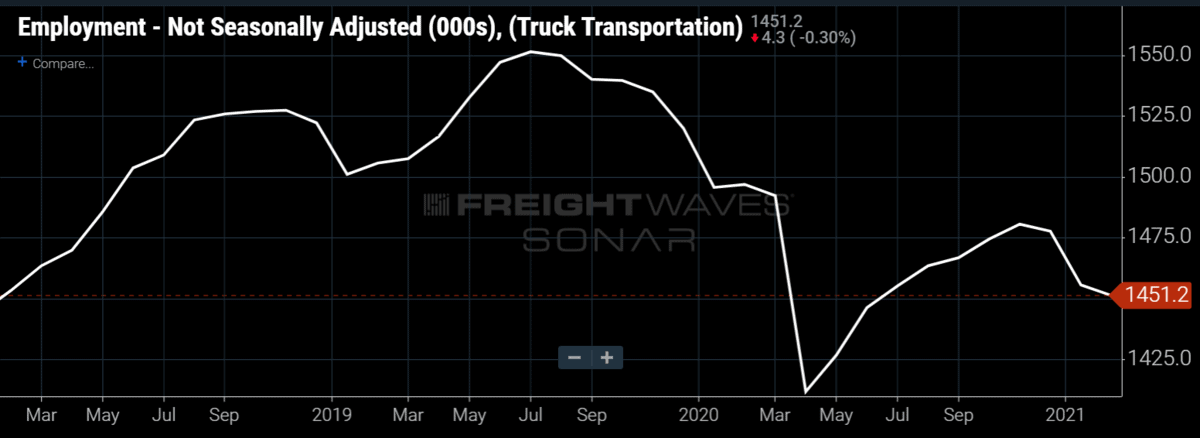Emina Nilsson is a very social person. So when an opportunity arrived in her native Sweden to drive a truck for a living, she didn’t immediately embrace it. Sitting by herself all day behind the wheel? Not exactly her idea of fun.
“I never saw myself as the type of girl who would drive a truck,” she told FreightWaves.
| International Women’s Day is March 8. Click here for more information. |
But this was not your traditional diesel truck. Instead, it was an electric truck that she would be driving for Einride, an autonomous and electric trucking company based in Stockholm.
She would have one route and a minimum of just four loads using the electric truck. Typically, diesel trucks have more stops to deliver to and more rounds. Nilsson said she enjoys having the flexibility to plan her day and take additional loads if she has time and also enjoys having time to talk to colleagues.
Plus, there’s another benefit.
“Driving an electric truck is much less stressful than driving a diesel truck” because diesel trucks are more unpredictable, Nilsson said.

She added that joining the transportation industry as an electric truck driver in 2019 is the best thing she’s ever done. Nilsson said she has “a great deal of fun” driving electric trucks, meeting with customers and being part of the truck driver community.
Evidently, she’s not alone.
Einride conducted a survey to explore women’s views on a career in the trucking industry and how interest was impacted by environmental factors and technological factors such as autonomous trucking and artificial intelligence (AI).
According to Einride, 45% of women surveyed said they would be interested in an autonomous trucking career.
“We see that there is a [gender] gap, and we want to help close it,” Linnéa Kornehed, co-founder and chief marketing officer at Einride, said in an interview with FreightWaves. In February, 1,005 Swedish professionals were surveyed, with 56% of the respondents being women.
Kornehed said the survey was just a first step in trying to better understand Einride’s audience and encourage more women’s involvement in the trucking sector.
Could technology lead to more women in trucking, safer roads and fewer trucking capacity constraints?
Kornehed said that having a more inclusive, equal representation of men and women can lead to better work cultures and performance. Research also indicates that women are safer drivers. A 2018 study conducted by the American Transportation Research Institute (ATRI) said that men are 88% more likely than women to have a reckless or negligent driving conviction; 78% more likely to have a seat belt violation; and 20% more likely to be involved in a crash.
Technology could help make trucking a more appealing industry for young men and women, Kornehed said. Women are entering the technology sector at increasingly high rates, and she noted that autonomous trucking improves work-life balance, working conditions and salaries for drivers.
Of the women who said they were not interested in a career in trucking, 52% said they would change their mind if they could drive autonomously. About 45% of women surveyed said they would attend college if it meant they could obtain a career in autonomous truck driving.
According to the survey, 58% of women respondents said they are interested in learning new skills that would allow them to work in the AI sector.
“As in all emerging technology, women should have a voice and equal opportunity to shape the future. This is our opportunity to create the future we’d like to see,” Kornehed said.
Women only represented 7.8% of the 3,364,000 total truck drivers on the road in the U.S. in 2020, according to U.S. Department of Labor data.
In 2020, the demand for more truck drivers ranked at the top of the ATRI Top Industry Issues analysis. According to the ATRI, some older truck drivers are retiring while others are leaving the industry due to health concerns related to the COVID-19 pandemic.
ATRI proposed increasing the number of women and minority truck drivers as a strategy to combat this issue and potentially improve driver safety.

About 58% of Einride survey respondents were ages 18-39, and 45% of women answered they would be interested in an autonomous trucking career. This indicates that young people, especially women, might have the potential to help alleviate pressure on truckload capacity.
Though being a female truck driver in a male-dominated field can be difficult, Nilsson said more people are willing to help if she needs direction or has an issue. “People are actually extremely kind,” she said.
FedEx Express Canada on Monday shared results of its first Women in Transportation and Logistics survey of 1,039 Canadian professional women. With 48% of respondents stating they are not interested in a career in transportation and logistics, this survey indicates that companies have work to do to better balance this male-dominated industry.
However, of those who said they were not interested, 37% said they didn’t have enough knowledge of the sector to know whether there were professional opportunities that would appeal to them.
“I would like to see Canada’s transportation, logistics and supply chain industry proactively encourage women to explore the exciting opportunities we offer,” Lisa Lisson, president at FedEx Express Canada, said in a statement.
Kornehed was happily surprised that 48% of women in the Einride survey said they would consider a job in trucking if they knew it would help the environment. “I think that is just beautiful to see,” she said.
Kornehed said more research is needed to find out how to better educate and encourage women in the transportation sector. She also said the Einride survey was a good starting point to understand how technology will impact trucking and women’s interest in the industry.
“My call to action is to get even more women into this space because it’s very much needed from a driver shortage perspective but also when it comes to being a more equal industry. We really need to get more women in there,” Kornehed said.
Click here for more FreightWaves articles by Alyssa Sporrer.
Related Stories:
Black History Month: CEO Hope White shares struggles and hope
GSCW chat recap: AI and automation in logistics
GSCW chat recap: Flexport.org founder on sustainability in retail supply chains








Doug Carlson
So… Diesel trucks are “unpredictable”, coming from someone whose never driven one, and if I’m understanding this correctly, doesnt really even drive her electric, autonomous truck either.
Hmm.
I drive an “unpredictable” diesel rig and it’s always been pretty predictable to me…
Sherry G Boone
Long Haul driving is one thing but in the LTL industry women often struggle when making deliveries and require assistance from the customer. A lot of times cooking sets for example can be very challenging for women and they require assistance quite often. If us women cannot perform the job equally to men then we should look elsewhere. So it is practical for women to do certain types of trucking industry work but other times it does not make as much sense.
Doug Carlson
There are no jobs in trucking women can’t perform equally. I work with a 20 year driver who has the best safety record of all of us! I see more women on the road these days then every before and I think many are better drivers than us guys because they tend to be more detail focused and less likely to say “ah, screw it” and do something less than safe. Just my opinion based on experience.
Jason E
Yes it seems to also have a lot to do with the fact that tractors are now pretty much all becoming automatic. Learning to shift the manual transmission was a barrier for many.